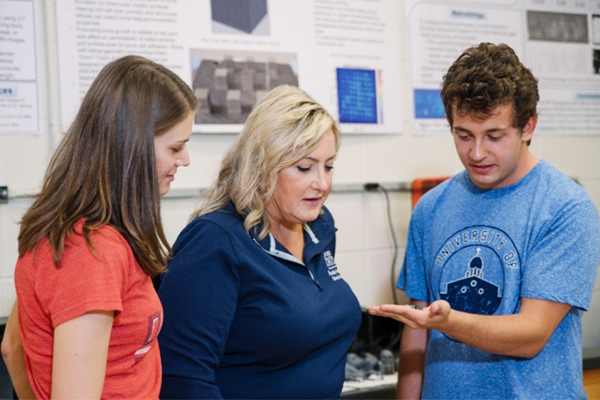Dayton Engineer

University of Dayton Graduate Student to Participate in Additive Manufacturing Symposium
By Cara Stevens, marketing and communications intern
Two University of Dayton engineering students were selected to present their research during the first Student Presentation Competition held in conjunction with the American Society for Testing and Materials (ASTM) International Symposium on Structural Integrity of Additive Manufactured Materials and Parts being held in Washington, D.C., in October.
Dimitri Papazoglou, a doctoral student studying electrical and computer engineering, and Brad Hripko, a senior mechanical engineering major, were selected to present their research at this prestigious competition.
ASTM is an international standards organization that develops and publishes technical standards for a wide range of materials, products, systems and services. For the past four years, the organization has hosted a symposium where various experts congregate to share information and research related to the structural integrity of additively manufactured materials and parts.
In order to ensure the structural integrity of additively manufactured parts, there is a need to establish performance standards, particularly when these components and structures are used in safety critical applications, such as healthcare.
Hripko, whose research involves 3D printing of polymers for finger prosthetics, is unable to travel to Washington, D.C., for the competition. However, Papazoglou, who has worked extensively on preliminary research for 3D metal printing custom orthopedic hip implants, will be one of 25 international student presenters.
“I'm excited to be going to the ASTM symposium; it's an honor that they invited me,” Papazoglou said. “My research monitors the printing of 3D metallic lattice structures that will be used for orthopedic implants using machine learning. Training an algorithm to detect when a part is defective is valuable in ensuring these implants we're putting into human bodies are defect free.”
Amy Doll, associate professor of electrical and computer engineering, is also excited for UD to be represented in the inaugural engineering student competition.
“We’re at the forefront of over 30 new ASTM standards being developed for in position monitoring and process control,” says Doll. “These new standards — developed concurrently with regulations from the FDA — will influence how orthopedic implants will be additively manufactured going forward.”
Doll continued, “This research creates tremendous opportunities for electrical and computer engineering students to engage in interdisciplinary research in an innovative biomedical space, which has significant promise for commercialization.” Doll has been working with several divisions at the University of Dayton Research Institute to advance this research.
Like the engineering field as a whole, Papazoglou is taking an interdisciplinary approach to his studies.
“I'm interdisciplinary. My master’s and doctoral degrees will be in in electrical engineering, but my bachelor’s degree is in mechatronic engineering,” Papazoglou said. “My thesis work and current research is interdisciplinary in nature —employing mechanical, materials, computer and electrical engineering skills for a biomedical application. I consider myself a mechatronics engineer at the end of the day.”
Additive manufacturing is on the cutting edge. It is constantly expanding and developing new regulations and the University of Dayton is at the frontline of this research.
Papazoglou will compete in the student competition at the ASTM Symposium on October 7, 2019.

Dr. Amy Doll with students Monica Yeager and Dimitri Papazoglou

